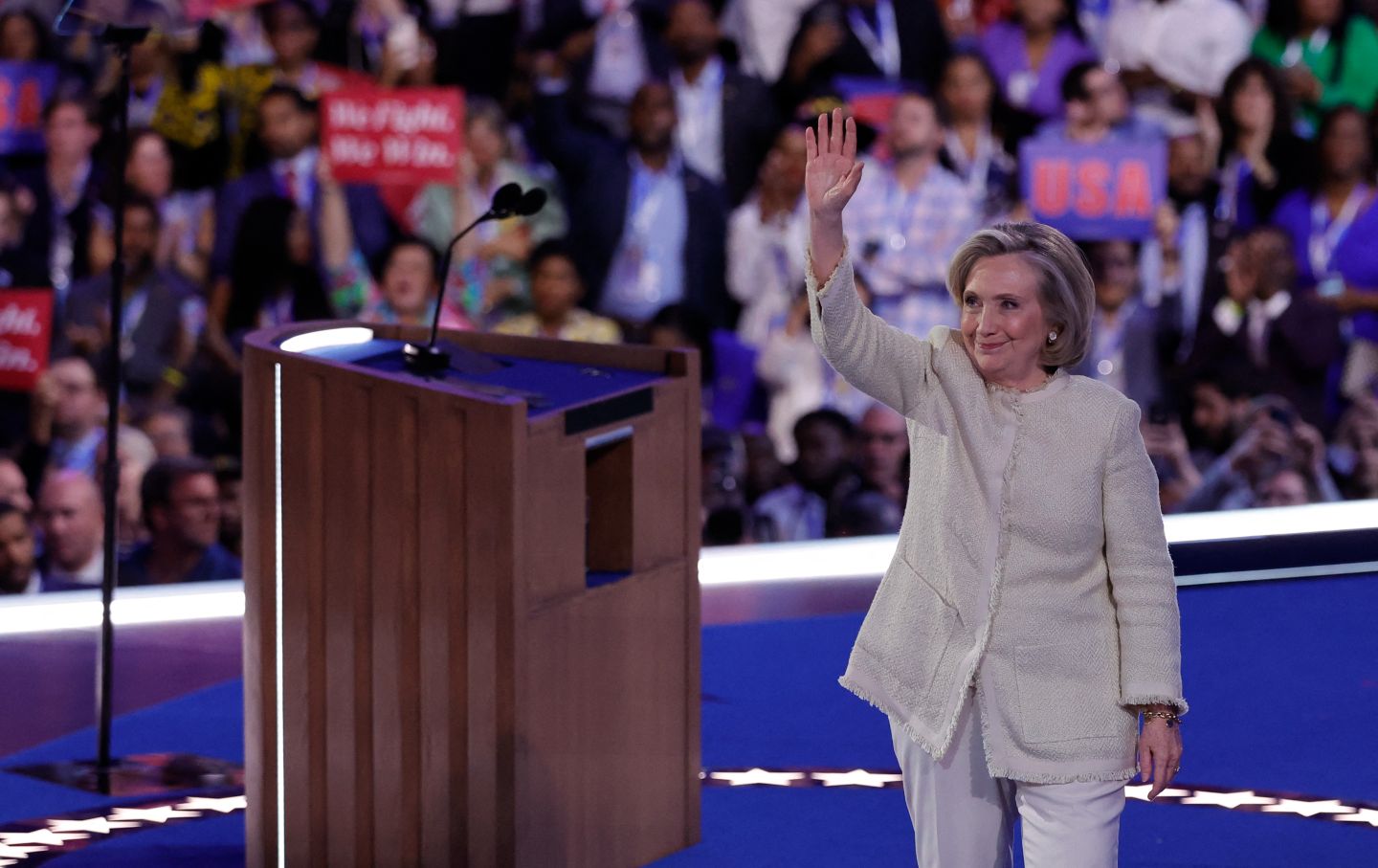Waving Goodbye to the Neoliberal Democratic Party
Hillary Clinton’s DNC speech marked the end of the centrist consensus of the Clinton–Obama years.

Former secretary of state Hillary Clinton waves as she leaves the stage after speaking on the first day of the Democratic National Convention at the United Center in Chicago on August 19, 2024.
(Kamil Krzaczynski / AFP via Getty Images)
Chicago—Hillary Clinton received a rapturous ovation as she strode confidently to the podium at the Democratic National Convention last night. Her voice still strong, she was a pro at work, celebrating Joe Biden while taking shots at Donald Trump. Her goal was clearly to portray Kamala Harris’s candidacy as a completion of her historic mission: “Together, we’ve put a lot of cracks in the highest, hardest glass ceiling. And tonight, tonight’s so close to breaking through once and for all.”
She roused the crowd, exhorting them to fight. But at the same time, she inadvertently revealed just how far the Democratic Party has moved from the politics of the Clinton and Obama eras. Harris presents herself as a fighter for working people on basic bread-and-butter issues. In public, Harris treats the fact that she will be the first mixed-race woman president as almost an afterthought.
The contrast between Hillary Clinton and Harris is telling. The centrist Washington consensus of the Clinton era is no more. While Obama’s two terms could be characterized as a continuation of the Bill Clinton years (with, as one pundit put it, Hillary running in 2016 for Clinton’s fifth term), Trump’s victory in 2016 and Biden’s four years began a dramatic break. The neoliberalism that Clinton and Obama championed—deregulation, free trade, fiscal austerity—has proved a failure. The neglect of America’s manufacturing base and of the workers and communities savaged by plant closings was both a political and an economic folly. The Clintons and Obamas are still stars of the party. Veteran Clinton-Obama aides and advisers still pack the DNC and fill roles in the Harris campaign. On the eve of the convention, The New York Times reported on the “quietly held bond” between Hillary Clinton and Harris, but progressives have won the argument inside the party.
Biden’s valedictory speech exposed the break. He rightly celebrated the fruits of his embrace of new, bold progressive policy: industrial policy focused on the transition to sustainable energy, rebuilding the country’s infrastructure, investing in new technology to be made here, imposing tariffs to protect vital industries, standing with workers, taking on Big Pharma, challenging monopolies, and more.
Sadly, the one area where there has been no significant change—a foreign policy based on the presumption that America is the “indispensable nation” tasked with policing the world—continues to plague our country and our politics, as we careen from one costly debacle to another: Think Iraq, Libya, the misbegotten War on Terror, and now Ukraine, the horror in Gaza, and the growing peril in the South China Sea.
The course Kamala Harris will pursue remains to be seen. The corporate wing of the party is already pressing to roll back antitrust efforts. The Times depiction the circle of her closest advisers isn’t particularly reassuring. But her early campaign choices—selecting Governor Tim Walz as her running mate, embracing the Biden break, presenting herself as member of the middle class, standing with unions, highlighting her commitment to take on Big Pharma and corporate greed on food prices—augur well. Her campaign, at least, understands which way the wind blows.
Disobey authoritarians, support The Nation
Over the past year you’ve read Nation writers like Elie Mystal, Kaveh Akbar, John Nichols, Joan Walsh, Bryce Covert, Dave Zirin, Jeet Heer, Michael T. Klare, Katha Pollitt, Amy Littlefield, Gregg Gonsalves, and Sasha Abramsky take on the Trump family’s corruption, set the record straight about Robert F. Kennedy Jr.’s catastrophic Make America Healthy Again movement, survey the fallout and human cost of the DOGE wrecking ball, anticipate the Supreme Court’s dangerous antidemocratic rulings, and amplify successful tactics of resistance on the streets and in Congress.
We publish these stories because when members of our communities are being abducted, household debt is climbing, and AI data centers are causing water and electricity shortages, we have a duty as journalists to do all we can to inform the public.
In 2026, our aim is to do more than ever before—but we need your support to make that happen.
Through December 31, a generous donor will match all donations up to $75,000. That means that your contribution will be doubled, dollar for dollar. If we hit the full match, we’ll be starting 2026 with $150,000 to invest in the stories that impact real people’s lives—the kinds of stories that billionaire-owned, corporate-backed outlets aren’t covering.
With your support, our team will publish major stories that the president and his allies won’t want you to read. We’ll cover the emerging military-tech industrial complex and matters of war, peace, and surveillance, as well as the affordability crisis, hunger, housing, healthcare, the environment, attacks on reproductive rights, and much more. At the same time, we’ll imagine alternatives to Trumpian rule and uplift efforts to create a better world, here and now.
While your gift has twice the impact, I’m asking you to support The Nation with a donation today. You’ll empower the journalists, editors, and fact-checkers best equipped to hold this authoritarian administration to account.
I hope you won’t miss this moment—donate to The Nation today.
Onward,
Katrina vanden Heuvel
Editor and publisher, The Nation


